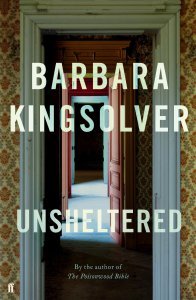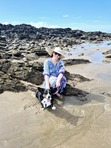New Release Book Review: Unsheltered by Barbara Kingsolver
About the Book:

The international bestselling author of The Lacuna, Flight Behaviour and The Poisonwood Bible and recipient of numerous literary awards – including the National Humanities Medal, the Dayton Literary Peace Prize, and the Orange Prize – returns with a timely novel that interweaves past and present to explore the human capacity for resilience and compassion in times of great upheaval.
2016 Vineland
Meet Willa Knox, a woman who stands braced against an upended world that seems to hold no mercy for her shattered life and family – or the crumbling house that contains her.
1871 Vineland
Thatcher Greenwood, the new science teacher, is a fervent advocate of the work of Charles Darwin, and he is keen to communicate his ideas to his students. But those in power in Thatcher’s small town have no desire for a new world order. Thatcher and his teachings are not welcome.
Both Willa and Thatcher resist the prevailing logic. Both are asked to pay a high price for their courage. But both also find inspiration – and an unlikely kindred spirit – in Mary Treat, a scientist, adventurer and anachronism.
A testament to both the resilience and persistent myopia of the human condition, Unsheltered explores the foundations we build in life, spanning time and place to give us all a clearer look at those around us, and perhaps ourselves. It is a novel that speaks truly to our times.
My Thoughts:
“No creature is easily coerced to live without its shelter.”
“Without shelter, we stand in daylight.”
“Without shelter, we feel ourselves likely to die.”
I always find it exceptionally difficult to review a novel that I love. You’d think it would be the easiest task ever, but I tend to procrastinate and dither around, putting it off, because the pressure of doing the novel justice weighs a bit too heavily. The irony of this is of course, in delaying my review of the novel, I’m definitely not doing it any justice at all. Twenty years ago I bought a new release novel that was selling cheap on account of it being a damaged copy. It was only the cover so I really didn’t care because I was still at university and very, very poor. That novel was The Poisonwood Bible and it had such a profound impact on me. Until I read Unsheltered, The Poisonwood Bible was still my favourite novel. Now it’s my second favourite. Barbara Kingsolver writes about as near to perfection as is humanly possible. Unsheltered is a novel for our times, it truly is. And I believe that it will have the most impact read now, in its present time of release. I’m not suggesting that it lacks a timelessness quality, more that its impact is wholly relevant today. For us, as we live in what has become an unsheltered time.
‘It’s going to be fire and rain, Mom. Storms we can’t deal with, so many people homeless. Not just homeless but placeless. Cities underwater and then what? You can’t shelter in place anymore when there isn’t a place. The Middle East and North Africa are almost out of water. Asia’s underwater. Syria is dystopian, Somalia, Bangladesh, dystopian. Everybody’s getting weather that never happened before. Melting permafrost means we’ve got like, a minute to turn this mess around, or else it’s going to stop us.’
The title ‘Unsheltered’ means many things. Within the context of the quote above, it’s about humanity becoming unsheltered as the world shifts under the effects of our habitation. On the more domestic level, for Willa, our present day protagonist, the things she expected to shelter her into retirement are no longer there: job security, affordable healthcare, a secure life for her children, higher education paying for itself through well paid and secure jobs. She’s living in poverty in an inherited house that is falling apart with her dying father-in-law, husband, two under-employed adult children and one tiny motherless grandson. She’s unsheltered, and no matter how hard she fights against it, things are not changing.
‘She aimed to be immune to the ambitions and disappointments that had maimed her parents’ existence and now were stirring up a national tidal wave of self-interest that Willa found terrifying. It was pretty clear there would be no stopping the Bullhorn, or someone like him. Here was the earthquake, the fire, flood, and melting permafrost, with everyone still grabbing for bricks to put in their pockets rather than walking out of the wreck and looking for light.’
Within the historical era of this novel, the concept of being unsheltered can be applied to a much broader context. Set in the early 1870s, at the conception of Darwin’s theory of evolution, the sheltered existence of those living in Vineland, a man-made capitalist utopia, is being threatened by science, knowledge, and the questioning of the creation of the universe, which of course, like dominoes cascading, leads to the questioning of everything.
‘A great shift was dawning, with the human masters’ place in the kingdom much reduced from its former glory. She could see how this might lead to a sense of complete disorientation in the universe. But still. The old paradigm was an obsolete shell; the writing on the wall was huge. They just wouldn’t read.’
At the heart of this is Thatcher Greenwood, a science teacher struggling against the constraints of teaching at the high school in Vineland.
‘I submit my lesson plans and he overrules all but the most mundane exercises in rote memory. Experimentation alarms him. Modern scientific theory enrages him, discussion of Darwin particularly but not only this. The suggestion of taking pupils outdoors to study nature, he treats as blasphemy.’
And then there’s Mary Treat, his neighbour, a woman living an unsheltered existence in the sense that she is a woman living alone in 1871. Her husband left her for the pursuit of a suffragette, and she’s not sorry to have seen the back of him. Some ten years older than Thatcher, the two form an instant friendship, spurred on by a mutual interest in science and a belief in the theory of evolution.
‘She was a real scientist. But into domestic things, bird nests and spider towers. How they learned to build them, what forces affected their survival. Evolution was a new idea, so I guess nature wasn’t just a cabinet of curiosities anymore. It was a machine, and everybody was keen to know what made it tick.’
Between Mary and Thatcher there rests a world of admiration.
‘The childhood wasted in curtseying lessons, the grasp of taxonomy and chemistry entirely self-taught, and still she had marched her theories to the doorstep of Asa Gray. Whereas Thatcher, when he once met the great man coming through the door of the Harvard library, had gone pale with the effort of trying to say good morning. How did a person come to be Mary Treat? He could stand all day watching energy, logic, and indifference to judgement combine with such glorious force.’
Both a scientific story as well as a very human story, Unsheltered is a novel that covers a terrific range of issues. Everything in the present day is paralleled with the story of the past: that crossroads for humanity where we have to question everything that has come before; the greed of a few at the peril of many. Barbara examines the rise of Trump via her character, The Bullhorn, and this set against Landis in the 1870s, the self appointed ‘President’ of Vineland. In her author notes, Barbara informs us that much of the 1870s storyline is based on fact and actual people. Some of the more outlandish things are actually the ones that turn out to be true. One of my favourite characters was Tig, Willa’s daughter. She comes to offer so much perspective on life right now, particularly on matters related to the environment, wastage and the state we are leaving the planet in for our beloved offspring. She regards reusing everything with a romanticism that appealed to me, but she was in no way at all naive. Her eyes were wide open, and just as Tig gave Willa much to think on, she’s done the same for me.
‘People are careless. If they break it there’s always more. But in Cuba, whatever it is, you probably can’t get more, so people take care. When you pick up a glass it’s like you’re raising a toast to all the people that drank from it before. All those happy anniversaries in a beautiful place, and all the future ones. It made me so happy, Mom. That night was our turn. We got to be in the treasure chest of time.’
Linking the two stories, past and present, is the house, the legacy of Thatcher and Mary, and the town of Vineland, that still exists, but in a different form. More specifically, Barbara links the past to the present by titling each of the chapters with the last words from the previous chapter. In terms of dual timeline narratives, Unsheltered could become the text on how it’s done.
Love is tangled with grief all through Unsheltered and examined in minute detail. Willa deconstructs her relationship with her husband, her father-in-law, her son, and her daughter. It’s that last relationship that benefits most from this introspection. As Willa comes to accept that she doesn’t fully understand her adult daughter and possibly never has, she winds up understanding her perfectly. I loved how their relationship became stronger throughout this story. There was something about Willa and Tig learning to be adults together within their mother and daughter relationship that appealed to me greatly.
‘To spend a night like this, inches from her daughter’s skull and everything it held inside, was a tender agony Willa could have explained to no one but her mother.’
For Thatcher and Mary, love was secondary to their story, but it triumphs over their adversity. For love to develop upon a foundation of such respect and admiration is a truly beautiful thing.
‘I sometimes feel I ought to take the pins from your hair and make my home in it, like a bird in a tree.’
There’s probably a million more words I could write about this novel. I loved it so much. Even when going back over the quotes I had marked for reflection, I found myself lingering over the passages either side, revisiting the story with enthusiasm. There’s a terrific interview with Barbara in this month’s Good Reading magazine. She provides a more articulate account than this on the themes contained within Unsheltered. I hope I’ve persuaded you to at least take a look at Unsheltered. It a brilliant novel, thought-provoking and beautifully written with a deep intelligence. If you’ve never read Barbara Kingsolver novel before (cue the horrified gasp) you won’t find a better one than this to start with.
‘A common mistake in thinking about the past is to assume people were more childlike than we are now.’




